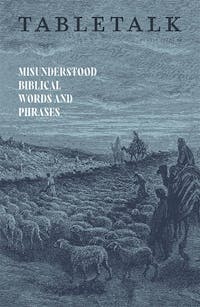
Request your free, three-month trial to Tabletalk magazine. You’ll receive the print issue monthly and gain immediate digital access to decades of archives. This trial is risk-free. No credit card required.
Try Tabletalk NowAlready receive Tabletalk magazine every month?
Verify your email address to gain unlimited access.
Words matter. Words mean things. No matter what the dogmatic adherents to the secularist religion of relativism would like us to believe, we know that words, phrases, and propositional truths have meaning, and that their meanings matter. The meanings of words can even be a matter of life and death. If people are not taught the meanings of words such as danger, caution, and emergency, they will surely find themselves in very serious trouble. Even more importantly, if people are not taught the meaning of words such as believe, sin, wrath, and grace, they will find themselves in eternal trouble. Everyone seems to acknowledge the importance of understanding words that apply to matters of physical life and death, but many people seem apathetic about words that are critical to their understanding of eternal life and death. That has perhaps never been the case so much as it is in our current generation.
While not all biblical words and phrases are matters of life and death, all biblical words and phrases are given to us by the One who holds the power of life and death. Our Lord has provided us with certain words that help us not only to know His truth but to know Him. That is precisely why we strive to understand the meanings of the words and phrases of Scripture—to the end that we will know God, love God, and worship God as God, the true God of Scripture, not the god of our own making whom many people presumptuously think they can describe by any words and phrases that they deem fitting.
As Christians, we believe that Scripture is the only infallible standard for faith and life. And we believe not only in sola Scriptura, that Scripture alone is our authority, we believe in tota Scriptura, that the total or the entirety of Scripture is the inspired and authoritative Word of God. Therefore, we believe in the verbal plenary inspiration of Scripture and thus not only in word-for-word inerrancy of Scripture but in every-jot-and-tittle inerrancy. We believe that it is not simply the general message of Scripture that is infallibly inspired by God but also its finest details. This is why faithful biblical scholars throughout history have labored—and continue to labor—so carefully to help us accurately translate and interpret each and every phrase, word, syllable, letter, accent, and breathing mark in the original languages of Scripture so that we might know the Word of God rightly and thus worship God appropriately according to who He truly is.
